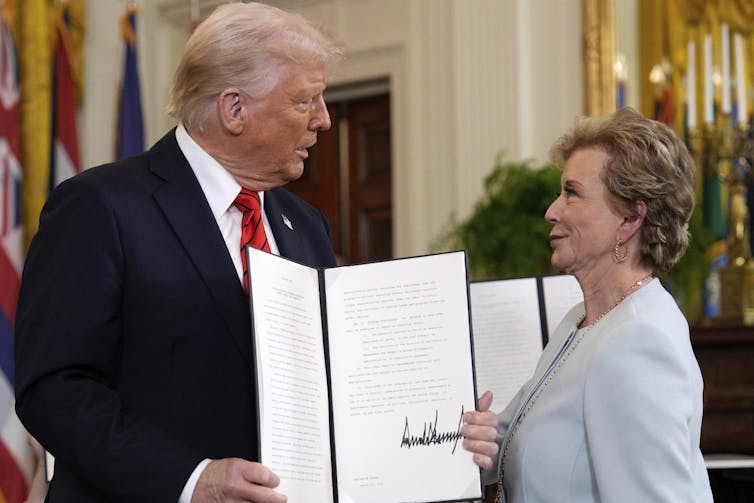

It’s been about six months for the reason that U.S. Division of Schooling despatched a “Pricey Colleague” letter to all colleges that obtain federal funding, warning them that they might threat shedding this cash in the event that they promote what the division calls “pervasive and repugnant” racial preferences.
The letter, amongst different issues, reversed earlier presidents’ positions on how variety, fairness and inclusion influences colleges’ disciplinary measures. It suggested colleges to, inside two weeks, start to remove all self-discipline protocols rooted in DEI, on the grounds that this work is discriminatory towards white college students.
Trump additionally issued an government order, “Reinstating Commonsense College Self-discipline Coverage,” in April 2025, doubling down on the letter.
Trump’s letter and government order exert an uncommon degree of affect over how colleges can determine the easiest way to show and, when crucial, self-discipline college students. It additionally cuts towards acknowledged analysis that Black, Latino and Native American college students are disciplined extra ceaselessly and harshly than white and Asian college students.
I’m an academic scholar who has spent the previous 13 years analyzing college self-discipline coverage. Whereas earlier administrations have issued “Pricey Colleague” letters to colleges, Trump’s is the primary that frames itself as if it had been regulation – setting a possible new precedent for the chief department to subject academic mandates with out the approval of the judicial or congressional branches of presidency.
Whereas all however two states have responded to Trump’s letter, about half of them have mentioned they aren’t going to adjust to its phrases – regardless of the administration’s menace of chopping funding if they don’t observe the steering.

Understanding DEI in schooling
Fairness-oriented schooling, or variety, fairness and inclusion, refers to an ideology and programming that intend to ameliorate patterns of racial inequality. Within the context of self-discipline in colleges, DEI methods may embrace lecturers having conversations with youngsters about their conduct, reasonably than instantly suspending them.
Analysis reveals that these methods might help cut back racial self-discipline gaps in educational achievement and disciplinary outcomes.
The Obama administration in 2014 acknowledged this analysis in its personal “Pricey Colleague” letter to colleges. The administration suggested colleges to both reform their self-discipline practices towards nonpunitive alternate options to suspension or threat being investigated for discrimination.
The primary Trump administration rescinded this letter in 2018.
Then, in 2023, the Biden administration launched a doc alongside the identical strains as Obama’s letter.
Trump’s February 2025 letter grouped all of those suggestions underneath the banner of “DEI” and argued that such practices are discriminatory, privileging college students of shade over white and Asian college students.
In his April government order, Trump reiterated that if colleges didn’t remove DEI, they’d be out of compliance with Title VI of the 1964 Civil Rights Act. This act prohibits discrimination on the premise of race, shade or nationwide origin,
Public college districts frequently must subject a certificates of compliance to the federal government exhibiting that their work is in step with Title VI.
Whereas the Trump administration characterizes DEI as “smuggling racial stereotypes and specific race-consciousness into on a regular basis coaching, programming, and self-discipline,” it doesn’t outline precisely what constitutes DEI programming.
This places college districts vulnerable to shedding funding in the event that they preserve any initiatives associated to racial equality.
Authorized considerations with Trump’s directives
The chief workplace and members of Congress sometimes subject “Pricey Colleague” letters, which aren’t legally binding, to advise colleges and others on coverage.
But Trump’s letter was written like a mandate and strengthened by an government order, which is legally binding.
Some students are calling the letter an “overreach” of authorized authority.
Within the spring of 2025, I analyzed states’ responses to Trump’s letter and government order.
Two states, Iowa and Tennessee, had not but offered public responses.
Twenty-three states complied with the administration’s directive by signing the letter as of Might 30. Some, like Oklahoma, not solely licensed the letter but in addition handed state legal guidelines banning DEI insurance policies and packages.
The remaining 25 states refused to certify the letter, asserting that they already complied with Title VI and that their insurance policies will not be discriminatory.
As well as, 19 of these 25 states sued the Trump administration over the letter in April, culminating in a court docket injunction later that month that briefly launched states from having to adjust to its calls for.
I seen that many states that refuted Trump’s letter used the identical precise phrases of their responses, signaling a concerted effort to withstand Trump’s directives. States that didn’t signal on to the letter however objected to its intent usually resisted on authorized grounds, ethics or each.
A authorized argument
Most states that rejected it grounded their refusal to signal Trump’s letter in federal regulation. They cited the Civil Rights Act and the Paperwork Discount Act, which protects states from having to file redundant paperwork. As a result of these states already licensed compliance with Title VI, this argument goes, they need to not have to take action once more underneath Trump’s directive.
Schooling commissioners from a few states, together with Illinois and Minnesota, additionally cited particular language utilized by Betsy DeVos, Trump’s former schooling secretary in his first time period, who supported DEI insurance policies.
Charlene Russell-Tucker, the schooling commissioner for Connecticut, additionally identified that to ensure that the federal authorities to cancel DEI programming, it must first legally change the definition of Title VI.
States resisting on different grounds
Some schooling officers additionally argued that their DEI work is ideologically crucial for offering supportive studying environments for all college students.
Patrick Tutwiler, Massachusetts’ interim schooling commissioner, wrote in an April 16 letter, for instance, that “Massachusetts will proceed to advertise variety in our colleges as a result of we all know it improves outcomes for all of our youngsters.”
Different officers displayed extra refined resistance. Randy Watson, Kansas’ schooling commissioner, for instance, affirmed the state’s “dedication to adjust to all Federal statutes,” together with Title VI – however didn’t explicitly deal with Trump’s “Pricey Colleague” letter.
Equally, Kentucky knowledgeable the Division of Schooling of its compliance with federal regulation, whereas concurrently encouraging native districts to proceed variety, fairness and inclusion work.
Mississippi’s state division of schooling identified that college districts function independently, so the state can’t power insurance policies on them. Nevertheless, Mississippi signaled compliance by citing a brand new state regulation banning DEI and confirmed that every of its particular person college districts have already licensed compliance with federal legal guidelines.

Extra authorized pushback
It’s not but clear what would possibly observe the April court docket injunction, which largely prevented the Division of Schooling from chopping federal funding to colleges that continued their DEI-related packages and insurance policies.
Whereas the Trump administration has made main cuts to the Division of Schooling, it has not introduced that states refusing to certify the letter will lose funding.
That is the primary time an administration is issuing such a direct menace to withhold Ok-12 funding, putting colleges in an unknown place, and not using a clear blueprint of tips on how to transfer ahead.
Hilary Lustick, Affiliate Professor of Schooling, UMass Lowell
This text is republished from The Dialog underneath a Artistic Commons license. Learn the authentic article.
![]()
SEE ALSO:
Trump Memo Doubles Down On Anti-DEI Necessities For Federal Funding














